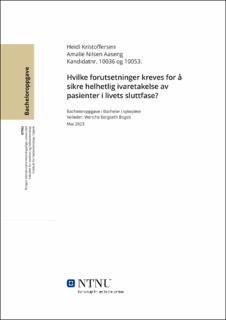| dc.contributor.advisor | Bogsti, Wenche Bergseth | |
| dc.contributor.author | Kristoffersen, Heidi | |
| dc.contributor.author | Aaseng, Amalie Nilsen | |
| dc.date.accessioned | 2023-06-30T17:19:53Z | |
| dc.date.available | 2023-06-30T17:19:53Z | |
| dc.date.issued | 2023 | |
| dc.identifier | no.ntnu:inspera:139478172:147586044 | |
| dc.identifier.uri | https://hdl.handle.net/11250/3074837 | |
| dc.description.abstract | Bakgrunn: En sentral del av samhandlingsreformen var overføring av pasienter fra spesialisthelsetjenesten til kommunehelsetjenesten. Pasientene har som konsekvens av dette større og mer komplekse behov. Dette stiller høyere krav til sykepleierens yrkesutøvelse når det kommer til kompetanse, og behovet for ressurser øker i takt med pasientenes komplekse sykdomsbilde og behov for lindring i livets sluttfase. De yrkesetiske retningslinjene for sykepleiere beskriver ansvar for å yte omsorgsfull hjelp, lindre lidelse og bidra til at pasienten får en naturlig og verdig død.
Hensikt: Hensikten med studien var å undersøke hvilke forutsetninger som
skal til for å sikre helhetlig ivaretakelse av pasienter i livets sluttfase.
Metode: Litteraturstudie. Studien benytter data hentet fra to ulike databaser basert på helsevitenskap. I tillegg benyttes litteratur, retningslinjer og lovverk. Analysen i denne studien er utført med inspirasjon fra metoden i Aveyard (2018).
Resultat: Fem artikler ble analysert hvor fire hovedtemaer ble identifisert for å belyse problemstillingen. Hovedtemaene omhandler kommunikasjon og informasjon, kompetanse, ressurser og ivaretakelse av pårørende.
Konklusjon: Statistikk og studier tydeliggjør kommunenes utfordringer overfor pasienter i livets sluttfase og deres pårørende. Sykepleieren trenger økt kompetanse vedrørende symptomlindring, klinisk kompetanse og kommunikasjon om døden, for å bli tryggere i rollen. Økte ressurser i form av tid og nok kompetente folk på jobb er helt nødvendig. Ivaretakelse av pårørende krever tettere og mer systematisk tilnærming. | |
| dc.description.abstract | Background: A central part of The Health Care Interaction reform was the transfer of patients from the Secondary Care to the Community Health Services. As a consequence, the patients have both greater and more complex needs. This increases the demands on the nurse’s professional practice when it comes to competence, and the need for resources increases in line with the complexity regarding patients in terminal phase. The professional ethical guidelines for nurses describes responsibility for providing caring help, alleviating suffering and contributing to the patient’s natural and dignified death.
Purpose: The purpose of the study was to examine which preconditions are required to ensure holistically care for patients in terminal phase.
Method: Literature study. The study uses data from two databases which is based on health sciences. In addition, literature, guidelines and legislation are used.
Result: Five articles were analyzed. Four main themes were identified to answer the research question.
The main themes are communication and information, competence, resources and care of relatives.
Conclusion: Statistics and studies clarifies the municipalities’ challenges with patients in the terminal phase and their relatives. The nurse needs increased competence regarding symptom relief, clinical competence and communication about death, in order to become more confident in the role. Increased resources in the form of time and enough competent staff at work are absolutely necessary. Caring for relatives requires a closer and more systematic approach. | |
| dc.language | nob | |
| dc.publisher | NTNU | |
| dc.title | Hvilke forutsetninger kreves for å sikre helhetlig ivaretakelse av pasienter i livets sluttfase? | |
| dc.type | Bachelor thesis | |
